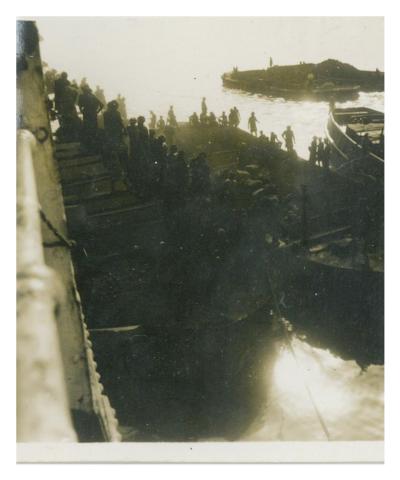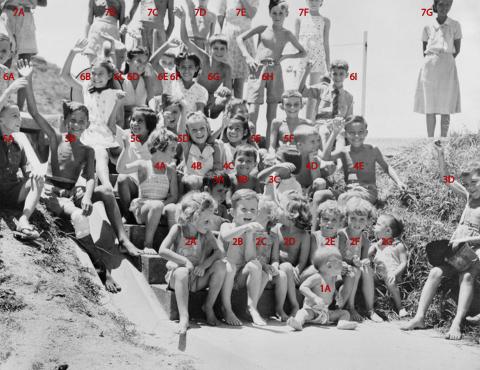Many men from camps up in the hills had found their way into Osaka and Kobe and joined the growing throng of “pleasure starved” POWs sightseeing and enjoying themselves in their newfound freedom. By the 10th September, when arrangements were made to transport us to Tokyo for repatriation, they had dispersed over such a large area that the only way which all the POWs could be gathered together was by means of the air raid sirens, which were blown as a signal for everyone to report back to camp.
Diary pages from this date
After work, got air-line bus to Stanley. ((The air line bus was obviously a cut above the old Vulcan orange buses but can't recall anything more about it.))
Arrived in camp about 6.30pm, saw Clifton who was also visiting, he said Mum and Mabel had embarked about 3pm. No sign of E. of Australia, apparently anchored very far out - could only see corvettes and launches.
Margery Fortescue and Adrian are in 'our' room (Tim in town). (Picked up remainder of my camp possessions).
Had a lift back to town on a Volunteer lorry; was dumped at foot of Garden Road. ((I knew there was a film show at Queen's Theatre)) Left my luggage with a surprised sentry outside HK & S. Bank, rushed to theatre, saw 'When Irish Eyes Are Smiling' - (technicolour). Mr J.A. Bendall came part way back with me and collected my luggage from sentry.
Afterward, to Mrs. Budden's birthday party (French Mission) - Xmas pudding from tin, and tomato sandwiches... lovely.
((7 May 2018. Barbara asked her sister Mabel what she remembers of the journey from Stanley Camp to the Empress of Australia:))
She told me that the Stanley internees first had to board a small naval ship at the little Stanley jetty; she was barefoot and was finding it painful walking on to the small boat, so one of the sailors picked her up and carried her aboard!
This boat took the passengers round to HK harbour where the Empress of Australia was moored (midstream), and they all were decanted on the Empress, then sailed for UK.
I was surprised to hear this, as I had always imagined the internees boarded the E of A off Stanley. (At that time I was busy working at my typewriter in Central, they were so exciting and confusing days, it was hard to keep up with all the wonderful things that were happening!)
Mabel and husband returned to HK after repatriation, retiring to Australia eventually. Many years ago Mabel sent her account of leaving Stanley to an Australian magazine which printed it. Soon after it appeared, she had a phone call from the sailor who had carried her aboard the little ship, who had recognised that incident.
An important moment in the return to normal life: Aaron Landau announces that the popular Jimmy's Kitchen is re-opening today. He also gives notice that he had no connection with Wong Po Tin who ran the Sai Mun Cafe on the same premises between May 1 and September 9, 1945.
The Landau family acted courageously in providing both legal and ilegal relief to Stanley during the war and were punished for it by the Kempeitai.
Source:
South China Morning Post, September 10, 1945, p. 2
Annette Williams, née Brown, was one of the internees who sailed away from Stanley Camp and Hong Kong on the Empress of Australia. Here is a copy of an email from Annette where she summarises her research into the events of that day, posted here with her kind permission:
I have finished my research into the internees leaving Stanley and being ferried out to the Empress of Australia on 10th September, 1945. It's been an exciting journey for me and I am so very happy to have discovered what actually happened and to let you know.
Firstly, knowing from my Mother, Una Brown, that we had been ferried out to the Empress on Australian Corvettes, I spoke to a friend who has an interest in Australian corvettes. She loaned me a book titled "Corvettes - little ships for Big Men" by Frank B. Walker (based on info from RAN and the RAN Corvettes Association) ISBN 0646259180. I read through it and found the corvettes that were in Hong Kong in August and September 1945, noting the name of each one.
Secondly, my friend suggested I try the Australian War Memorial collection https://www.awm.gov.au/collection/C1420122. It was a goldmine! I scrolled through the monthly reports for September 1945 for all the corvettes I had listed, and checked their movements for 10th September. I discovered there had been five corvettes which ferried us out to the Empress of Australia, which was not anchored in deep water just out of Stanley Bay nor in Hong Kong Harbour, but was actually anchored in Junk Bay, which is part of the mainland just outside the Lyemun Pass eastern entrance to the Harbour.
The five corvettes were Bathurst, Broome, Gawler, Geraldton, Launceston. I have listed the comments from their reports for the 10th September below.
(Conner, you mentioned the Wagga to me during our last phone call. Just as a matter of interest the monthly report for September for the Wagga said she ferried 150 internees out to the H.M.S. Smiter on the 22nd September, after we had left Hong Kong. Some other facts I discovered were that on 1st September the Fremantle had transferred hospital cases from Stanley to the Oxfordshire at Kowloon and on 4th September she had led the Empress of Australia into Hong Kong Harbour. The Castlemaine, which is currently anchored in Williamstown, Melbourne, as a museum ship, was one of the corvettes accompanying the fleet as it entered HK Harbour on 30th August. She also helped berth the Empress on 4th September. On the evening of the 25th September Castlemaine was in Stanley Bay and entertained, on board, about 25 internees from Stanley Camp. I have been on board the Castlemaine in Williamstown and felt a very strong connection with my history. I will visit her again very soon.)
Note: The monthly reports I have been looking at and listed below have copyright attached to them. Item copyright: Commonwealth of Australia copyright. Copying Provisions: Copy provided for personal non-commercial use, permission from copyright holder must be sought for commercial use.
Extract from Letters of Proceedings for the month of September, 1945:
- Geraldton: "10th September 1945. Geraldton, Gawler, Launceston, Broome, and Bathurst sailed at 0700 for Stanley Bay to embark 1,000 Prisoners of War and Internees and transport them to the Empress of Australia in Junk Bay, Bathurst sweeping Double Oropesa along the route, followed by Gawler and Launceston 'L.L.' sweeping.
All ships anchored in Stanley Bay before 1030 and it soon became obvious that the organisation had failed badly. The landing barges which were to have brought the passengers to the ships were not there and never arrived. The luggage, one suitcase and one cabin trunk per passenger, was not ready and came down to the jetty one small truck load at a time. Many of the passengers were still in doubt as to whether they were travelling or not, and a committee engaged in revising the embarkation list did not finish until after 1430.
The ships' boats did a very good job and two motor-cutters send round by H.M.C.S. Prince Robert and two small ferries rushed from Hong Kong made it possible for the last ship (Geraldton), to sail from Stanley Bay at 1845.
Geraldton secured outside Launceston alongside the Empress of Australia at 1950 and disembarkation was completed by 2100."
- Bathurst: "remained on Green Island patrol until 0605 on 10th September when she was withdrawn and proceeded to sweep with double Orepesa a channel from Tathong light to Stanley Bay in preparation for embarkation and transfer of internees from Stanley Camp to Empress of Australia. Remained at anchor in Stanley Bay until 1747 same day when, having embarked 234 civilian internees Bathurst weighed and proceeded alongside Empress of Australia in Junk Bay to discharge same. On completion of disembarkation at 2030 anchored in Junk Bay."
- Broome: "10th. Broome, in company with Geraldton, Launceston, Gawler, and Bathurst, proceeded at 0648 to embark prisoners of War from Stanley Camp and ferry them to the Empress of Australia which was anchored in Junk Bay. Bathurst carried out a double orepesa sweep into Stanley Bay, on completion of which, ships anchored close to the shore and commenced to embark luggage and passengers. Broome was alongside the Empress of Australia by 1731, but found it necessary to return to Stanley later to disembark luggage and passengers placed on board in error. On completion of this trip, the ship returned to anchorage off Naval Dockyard where the anchor was let go at 2117."
- Gawler: "Weighed at 0658 on the 10th with Launceston and streamed SA & KK sweep. Carried out sweep to Stanley Bay where 210 internees were placed on board and taken to the Empress of Australia for evacuation. I returned to anchorage at 1935."
- Launceston: "0700 Weighed and proceeded to sea, Gawler in company, to carry out mine-sweeping operations to Stanley Bay. 1000 recovered sweeps and entered Stanley Bay. Sent boats inshore and working party to assist with transport of released internees and their baggage. 1820 Weighed and proceeded to Junk Bay with 240 internees on board. 1900 secured alongside Empress of Australia and transferred internees. 2232 Slipped and proceeded to anchor for the night. Wardroom had the pleasure of entertaining Commander Creer, released from Internment Camp."
Conner Hackett, mentioned above, has previously uploaded this rare photo. It was taken on the journey away from Hong Kong, though the exact location is not known. It appears to show men in pairs on the steps, passing luggage up from the barges onto a larger ship:
Annette and Conner both appear in a photo taken at Stanley Camp a few days earlier. They're sitting next to each other at the left side of the bottom step:
Fine & hot.
Took in odd gear to Prison store.
Gave G torch for her birthday. 36. G to clinic. Packed up. Helped G with their other room.
Left them at 3.30pm & boarded “Geraldton” for “E of A”. On board 9pm. Proper troopship accommodation. E6.Mess 139. Nice supper at 10.20pm.
Goodbye Gwen dearest, for a little while only I hope.

